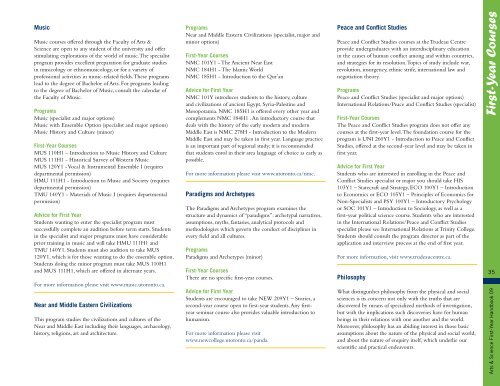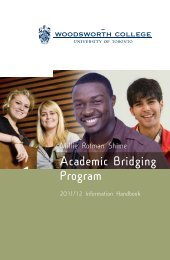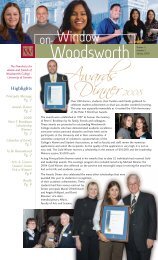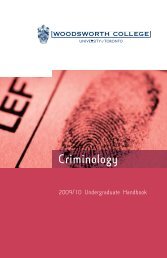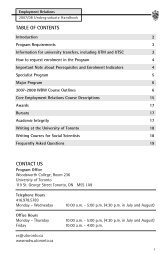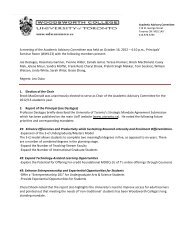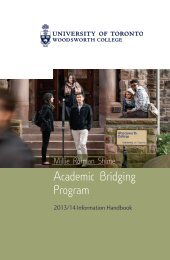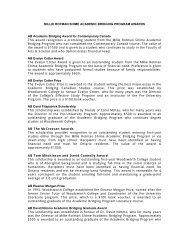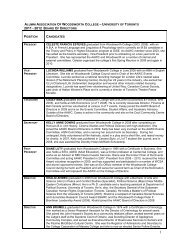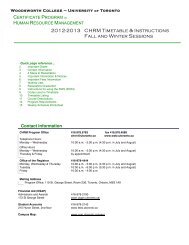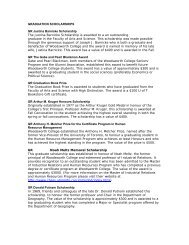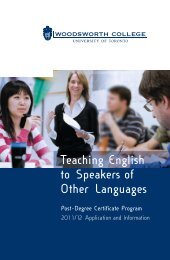First-Year Handbook 2009/10 - Woodsworth College - University of ...
First-Year Handbook 2009/10 - Woodsworth College - University of ...
First-Year Handbook 2009/10 - Woodsworth College - University of ...
Create successful ePaper yourself
Turn your PDF publications into a flip-book with our unique Google optimized e-Paper software.
MusicMusic courses <strong>of</strong>fered through the Faculty <strong>of</strong> Arts &Science are open to any student <strong>of</strong> the university and <strong>of</strong>ferstimulating explorations <strong>of</strong> the world <strong>of</strong> music. The specialistprogram provides excellent preparation for graduate studiesin musicology or ethnomusicology, or for a variety <strong>of</strong>pr<strong>of</strong>essional activities in music-related fields. These programslead to the degree <strong>of</strong> Bachelor <strong>of</strong> Arts. For programs leadingto the degree <strong>of</strong> Bachelor <strong>of</strong> Music, consult the calendar <strong>of</strong>the Faculty <strong>of</strong> Music.ProgramsMusic (specialist and major options)Music with Ensemble Option (specialist and major options)Music History and Culture (minor)<strong>First</strong>-<strong>Year</strong> CoursesMUS 1<strong>10</strong>H1 – Introduction to Music History and CultureMUS 111H1 - Historical Survey <strong>of</strong> Western MusicMUS 120Y1 - Vocal & Instrumental Ensemble I (requiresdepartmental permission)HMU 111H1 - Introduction to Music and Society (requiresdepartmental permission)TMU 140Y1 - Materials <strong>of</strong> Music I (requires departmentalpermission)Advice for <strong>First</strong> <strong>Year</strong>Students wanting to enter the specialist program mustsuccessfully complete an audition before term starts. Studentsin the specialist and major programs must have considerableprior training in music and will take HMU 111H1 andTMU 140Y1. Students must also audition to take MUS120Y1, which is for those wanting to do the ensemble option.Students doing the minor program must take MUS 1<strong>10</strong>H1and MUS 111H1, which are <strong>of</strong>fered in alternate years.For more information please visit www.music.utoronto.ca.Near and Middle Eastern CivilizationsThis program studies the civilizations and cultures <strong>of</strong> theNear and Middle East including their languages, archaeology,history, religions, art and architecture.ProgramsNear and Middle Eastern Civilizations (specialist, major andminor options)<strong>First</strong>-<strong>Year</strong> CoursesNMC <strong>10</strong>1Y1 - The Ancient Near EastNMC 184H1 - The Islamic WorldNMC 185H1 - Introduction to the Qur’anAdvice for <strong>First</strong> <strong>Year</strong>NMC <strong>10</strong>1Y introduces students to the history, cultureand civilizations <strong>of</strong> ancient Egypt, Syria-Palestine andMesopotamia. NMC 185H1 is <strong>of</strong>fered every other year andcomplements NMC 184H1 . An introductory course thatdeals with the history <strong>of</strong> the early modern and modernMiddle East is NMC 278H - Introduction to the ModernMiddle East and may be taken in first year. Language practiceis an important part <strong>of</strong> regional study; it is recommendedthat students enrol in their area language <strong>of</strong> choice as early aspossible.For more information please visit www.utoronto.ca/nmc.Paradigms and ArchetypesThe Paradigms and Archetypes program examines thestructure and dynamics <strong>of</strong> “paradigms”: archetypal narratives,assumptions, myths, fantasies, analytical protocols andmethodologies which govern the conduct <strong>of</strong> disciplines inevery field and all cultures.ProgramsParadigms and Archetypes (minor)<strong>First</strong>-<strong>Year</strong> CoursesThere are no specific first-year courses.Advice for <strong>First</strong> <strong>Year</strong>Students are encouraged to take NEW 209Y1 – Stories, asecond-year course open to first-year students. Any firstyearseminar course also provides valuable introduction tohumanism.For more information please visitwww.newcollege.utoronto.ca/panda.Peace and Conflict StudiesPeace and Conflict Studies courses at the Trudeau Centreprovide undergraduates with an interdisciplinary educationin the causes <strong>of</strong> human conflict among and within countries,and strategies for its resolution. Topics <strong>of</strong> study include war,revolution, insurgency, ethnic strife, international law andnegotiation theory.ProgramsPeace and Conflict Studies (specialist and major options)International Relations/Peace and Conflict Studies (specialist)<strong>First</strong>-<strong>Year</strong> CoursesThe Peace and Conflict Studies program does not <strong>of</strong>fer anycourses at the first-year level. The foundation course for theprogram is UNI 260Y1 - Introduction to Peace and ConflictStudies, <strong>of</strong>fered at the second-year level and may be taken infirst year.Advice for <strong>First</strong> <strong>Year</strong>Students who are interested in enrolling in the Peace andConflict Studies specialist or major you should take HIS<strong>10</strong>3Y1 – Statecraft and Strategy, ECO <strong>10</strong>0Y1 – Introductionto Economics or ECO <strong>10</strong>5Y1 – Principles <strong>of</strong> Economics forNon-Specialists and PSY <strong>10</strong>0Y1 – Introductory Psychologyor SOC <strong>10</strong>1Y1 – Introduction to Sociology, as well as afirst-year political science course. Students who are interestedin the International Relations/Peace and Conflict Studiesspecialist please see International Relations at Trinity <strong>College</strong>.Students should consult the program director as part <strong>of</strong> theapplication and interview process at the end <strong>of</strong> first year.For more information, visit www.trudeaucentre.ca.PhilosophyWhat distinguishes philosophy from the physical and socialsciences is its concern not only with the truths that arediscovered by means <strong>of</strong> specialized methods <strong>of</strong> investigation,but with the implications such discoveries have for humanbeings in their relations with one another and the world.Moreover, philosophy has an abiding interest in those basicassumptions about the nature <strong>of</strong> the physical and social world,and about the nature <strong>of</strong> enquiry itself, which underlie ourscientific and practical endeavours.Arts & Science <strong>First</strong>-<strong>Year</strong> <strong>Handbook</strong> 09<strong>First</strong>-<strong>Year</strong> Courses35


